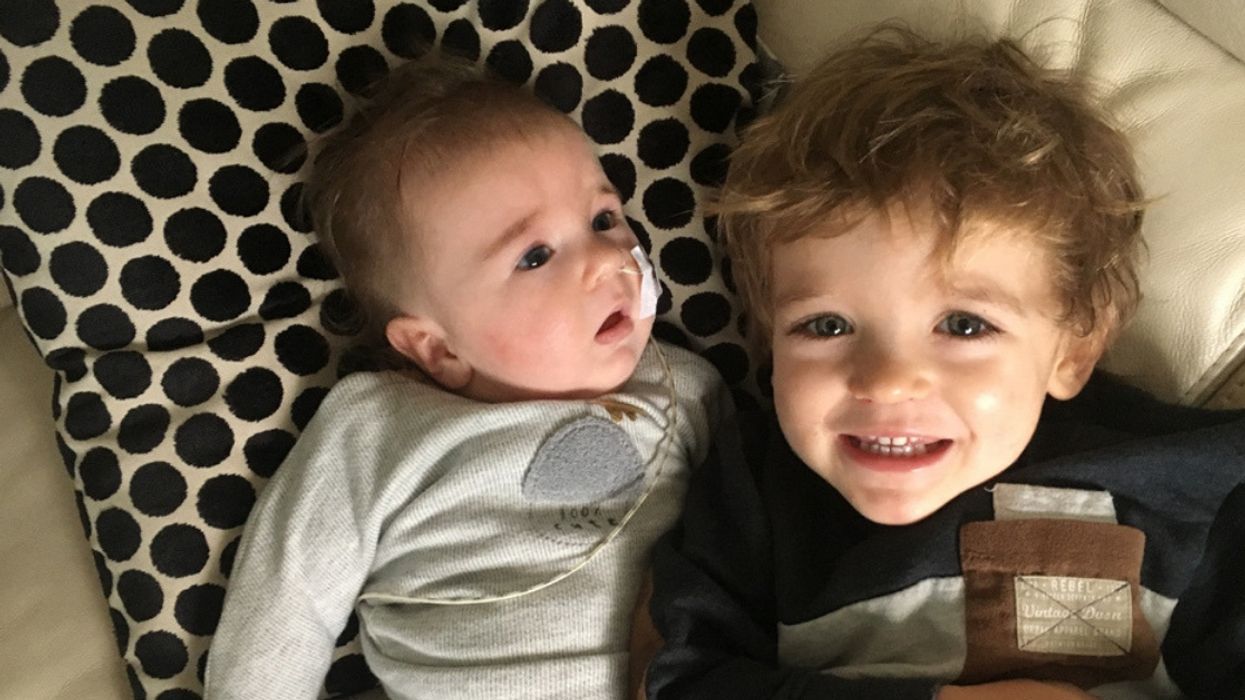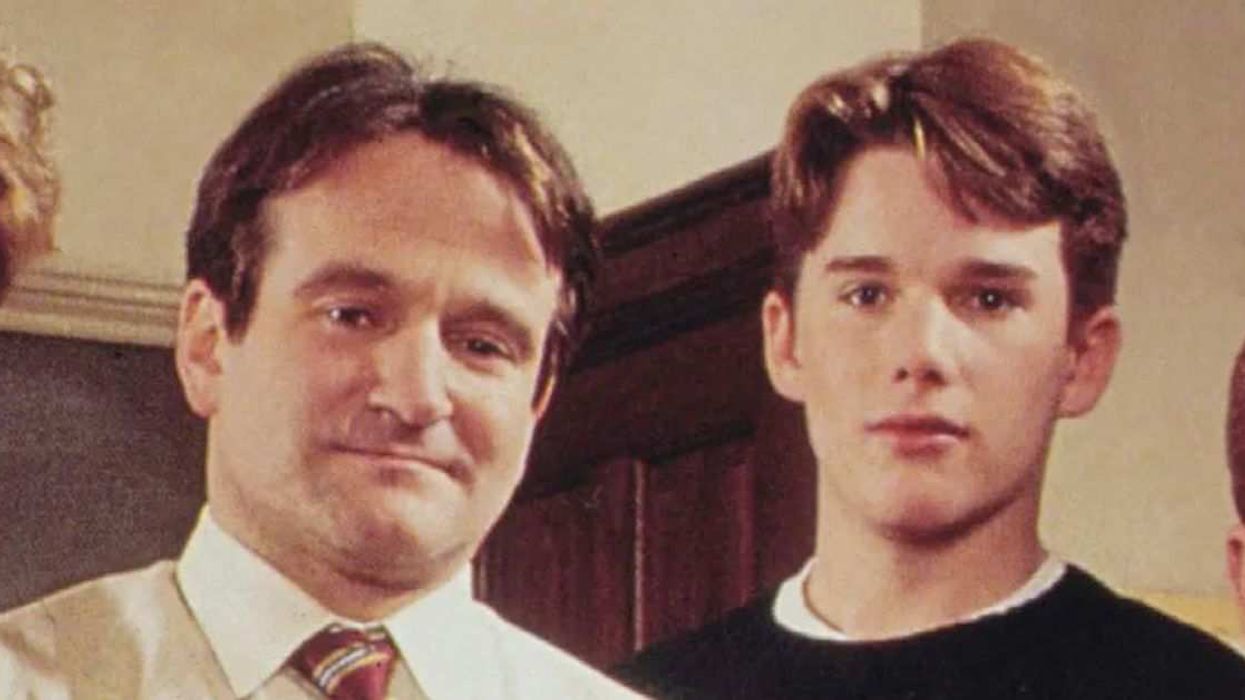A devoted mom has revealed how, at just two years old, her son is already on a strict low carb, high protein, no sugar diet because of a genetic condition that makes him constantly hungry.
The minute Kirsty Milbanhac, 38, cuddled newborn Reggie when he arrived into the world in July 2017, she noticed his lack of muscle tone and her mother's instinct told her something was wrong.
But it wasn't until February 2018 that the tot was diagnosed with Prader-Willi Syndrome (PWS), a genetic condition causing a range of learning difficulties and behavioral problems, including an excessive appetite, which has seen him placed on an ultra-restrictive diet at just two years old.
Kirsty, who works for a TV company and lives in Raynes Park, south west London, said: “When Reggie was first diagnosed, I took it relatively well and tried to think positive. But now, it has sunk in a bit more and I am realizing how different life will be for him.
“One of the biggest struggles is restricting his diet. Food can't be seen as a reward – there's no treating him to chocolate or sweets.
“Reggie follows a really strict low carb, high protein, no sugar diet. I wanted to start it now, so he grows up not knowing any different. He's never had things like white bread or pasta, so he doesn't know to miss them."

She added: “It's hard to say no when he asks for more food, but we just can't give in, otherwise where does it stop?"
Kirsty, who also has an older boy, Max, four, with her construction manager husband Jimmy, 36, enjoyed a textbook pregnancy with Reggie until about two weeks before her due date, when medics noticed her bump growth had slowed and booked her in for a precautionary scan.
When the results showed her unborn child was far smaller than expected, it was feared her placenta was not working properly, leading doctors to recommend she be induced.

“I'd had a small bump with Max, too, and he was perfectly healthy, so I figured I just carried small babies," she said.
“I couldn't deal with it all at first. I thought it was a fairly routine appointment, then suddenly I was being told I'd need to have my baby as soon as possible.
“I went home that night, which was a Friday, to digest it all, then admitted myself to be induced on the Monday once I had processed everything."

Kirsty was induced as planned at south west London's Kingston Hospital, but labor progressed slowly and Reggie was not born until four days later, on July 6, weighing 4lb 10oz.
She continued: “I hate this word, but I could see right away that things weren't normal. Where Reggie had no muscle tone, he was really floppy.
“He was also really struggling to latch on and feed."

When his blood sugar levels began to drop the next morning, Reggie was taken to the neonatal unit, where he remained for two weeks, as doctors battled to find what was causing his symptoms – running tests including an MRI scan, when he was only days old.
“When I was told Reggie was being kept in hospital, I just broke down," recalled Kirsty. “To have no idea what's wrong with your child is just terrifying."
Eventually, the baby was allowed home, but with tests failing to discover what was wrong, doctors were still unable to give a diagnosis.
For months, he was seen by various different specialists, who tested for everything from cerebral palsy to spinal muscular atrophy, a muscle weakening condition, the most severe form of which is rarely survivable beyond a few years.
“I was basically planning my son's funeral in my head," said Kirsty. “I was terrified doctors would tell us he had something that meant he only had a few years with us.
“While all this was going on, he was still so floppy he could barely move. All he did was sleep and he made no noise. We'd be in hospital in the premature baby unit waiting for appointments, surrounded by crying, screaming babies – but he'd just be silent."

With Reggie's muscle tone so weak that he could scarcely even muster the strength to cough, he was admitted to hospital a few times after common colds developed into dangerous infections.
On one occasion, he even wound up on a ventilator – though thankfully pulled through.
Then, during one hospital visit in early 2018, a doctor mentioned PWS in passing, asking Kirsty if Reggie had been tested for it.

“At that point, I wasn't sure what he had and hadn't been tested for," she said. “It's difficult when you don't know what it is that consultants are looking for.
“We were due to see the genetics team a couple of weeks later and they mentioned the condition too, and said they were going to dig a little deeper with tests."
Finally, in February 2018, Reggie was officially diagnosed with PWS.

According to the Foundation for Prader-Willi Research, the condition occurs either when part of chromosome 15 is missing or deleted, as a result of a mutation, or when, like Reggie, an individual inherits two chromosome 15s from their mother and none from their father.
Speaking of the diagnosis, Kirsty said: “On one hand, it was a relief to finally know what was happening – particularly as we'd been given much bleaker possibilities before.
“I had time to properly research and get my head round it, so it wasn't this huge bombshell, like if he'd been born, then we got the news a few days later."

She added: “In time though, I began to think more and more about how life will be different for him."
Now, Reggie's day-to-day life is all about adapting to the typical symptoms of PWS, like floppiness caused by weak muscles, which can see him tire easily and means that he cannot yet walk.
As a result, he has regular physiotherapy to build his strength up.
In addition, his speech is delayed, and Kirsty has started seeing hints of behavioral problems that can be symptomatic of the condition, according to the NHS.
She explained: “We aren't quite in the thick of it yet, as Reggie is still so young, but he has these meltdowns that seem to go beyond normal toddler tantrums.
“The only thing we can do is let him calm down. However, I can't be sure yet if it's related to the PWS."

Kirsty continued: “Every PWS patient is different and there may be certain symptoms that suddenly hit as Reggie grows older. I know the disparity between where he is developmentally and where other children his age are may increase as he gets older too.
“It really is just a case of wait and see right now."
As well as working tirelessly to ensure Reggie sticks to his diet without feeling deprived – especially as he cannot have the same treats as his big brother – Kirsty must also navigate some of the more unusual symptoms of PWS, like struggling to maintain a regular temperature and being less sensitive to pain.

She continued: “I've had to get my head around a lot of information about nutrition. People aren't always aware of what's in their food, but that isn't an option for us.
“Reggie, who is also on growth hormone treatment as PWS affects his stature, basically follows the healthiest diet you can imagine. I don't want him to feel like he never gets treats, so I try to get around it by giving him alternatives, like avocado ice lollies that have no sugar in.
“His temperature can be tricky, as his body can't naturally heat or cool itself as well as other people's. His lips go blue very quickly when he's cold. As with many children with PWS, he can't feel pain that well either. On one hand, that meant teething was a breeze – but I do worry about the dangers, as he might not feel it if he really hurts himself."

Although adapting to daily life can be challenging, Kirsty, who has found connecting to other PWS families through Facebook groups an invaluable support, is determined to remain positive and give her boy the best life possible.
Recently, a friend set up a GoFundMe page for her to help gather money for Reggie to go on a bespoke three-week course, where he will have access to specialists – as well as the opportunity to meet children just like him – who will help him edge closer to being able to walk independently.
Happily, the money, totaling £3,500 (~$4,250), was soon raised, and now any excess funds gathered by the page are to be split between the Foundation for Prader-Willi Research and the charity Prader-Willi Syndrome UK.

Kirsty said: “We'd love the extra money raised by GoFundMe to go towards research – and maybe even one day, finding a cure.
“When you look at how far medical breakthroughs come all the time, you have to wonder where we'll be in five or 10 years from now.
“A cure may not be that close but, hopefully, more research will at least help manage aspects of Reggie's condition, like the behavioral issues and overeating."

She concluded: “It is difficult as his mum knowing that, right now, an independent life will be difficult for him.
“He will require constant care and, as a free-spirited parent who has always travelled and wanted that for my children, that was a hard hurdle to get over.
“But this is the only life Reggie has ever known, so I am determined to make it as happy as possible."
To donate, visit www.gofundme.com/sky-diving-for-reggie














 mass.gov
mass.gov cdss.ca.gov
cdss.ca.gov
 Sad Break Up GIF by Ordinary Frends
Sad Break Up GIF by Ordinary Frends  so what who cares tv show GIF
so what who cares tv show GIF  Iron Man Eye Roll GIF
Iron Man Eye Roll GIF  Angry Fight GIF by Bombay Softwares
Angry Fight GIF by Bombay Softwares 
 @jimmykimmellive/Instagram
@jimmykimmellive/Instagram @jimmykimmellive/Instagram
@jimmykimmellive/Instagram @jimmykimmellive/Instagram
@jimmykimmellive/Instagram @jimmykimmellive/Instagram
@jimmykimmellive/Instagram @jimmykimmellive/Instagram
@jimmykimmellive/Instagram @jimmykimmellive/Instagram
@jimmykimmellive/Instagram @jimmykimmellive/Instagram
@jimmykimmellive/Instagram @jimmykimmellive/Instagram
@jimmykimmellive/Instagram @jimmykimmellive/Instagram
@jimmykimmellive/Instagram @jimmykimmellive/Instagram
@jimmykimmellive/Instagram @jimmykimmellive/Instagram
@jimmykimmellive/Instagram @jimmykimmellive/Instagram
@jimmykimmellive/Instagram @jimmykimmellive/Instagram
@jimmykimmellive/Instagram @jimmykimmellive/Instagram
@jimmykimmellive/Instagram